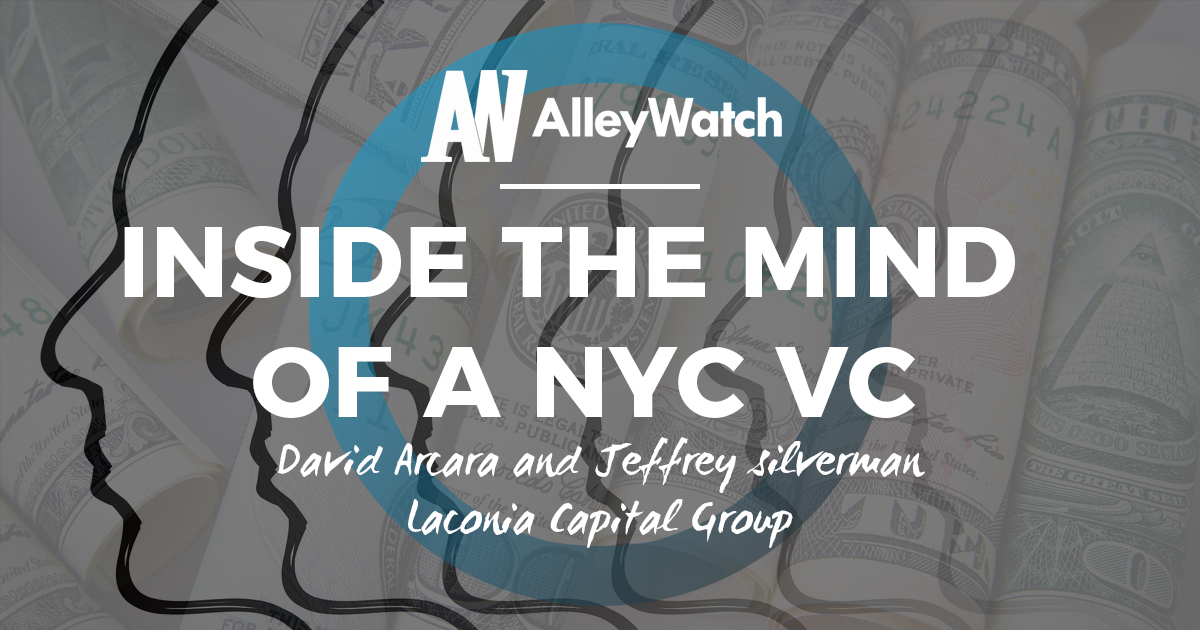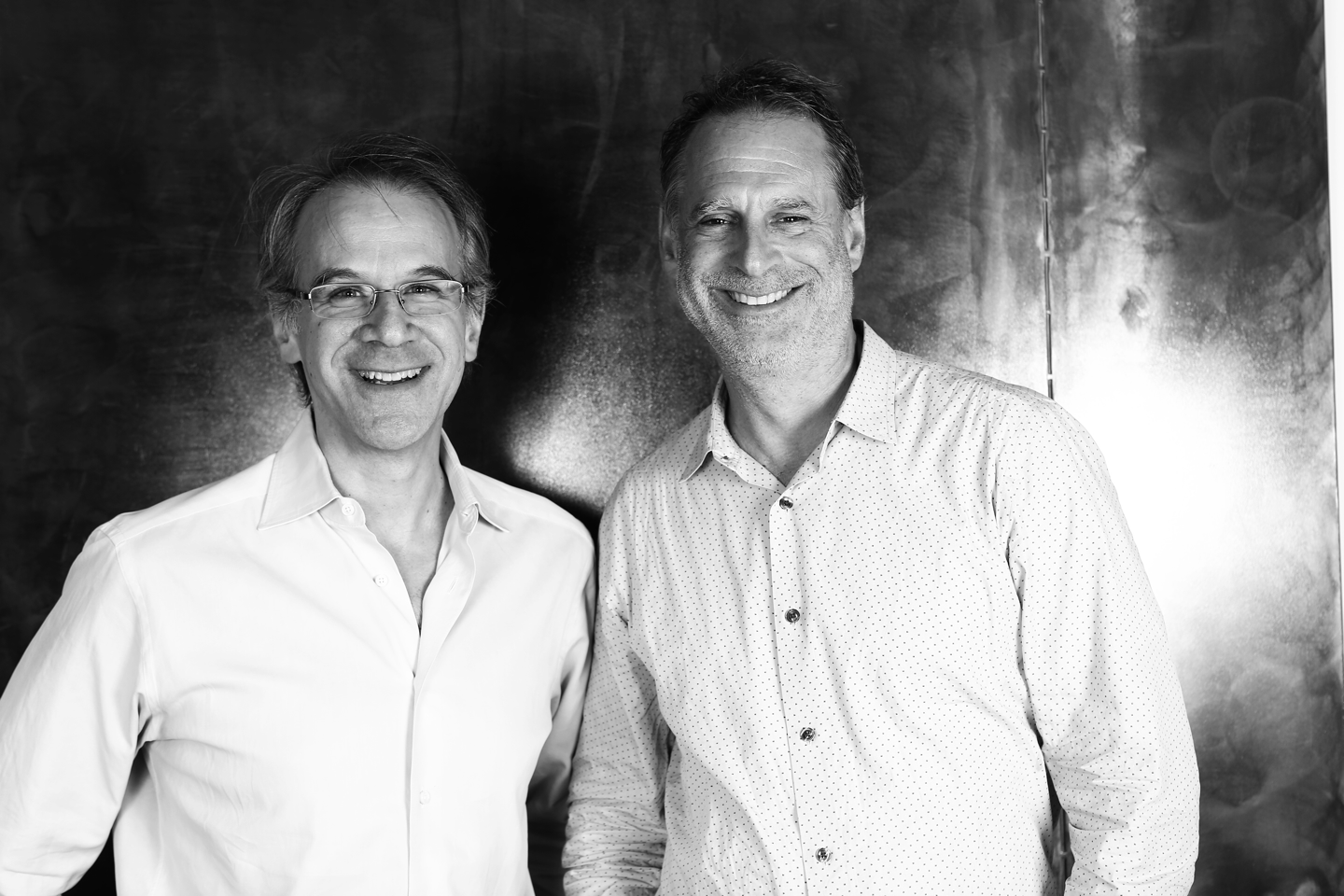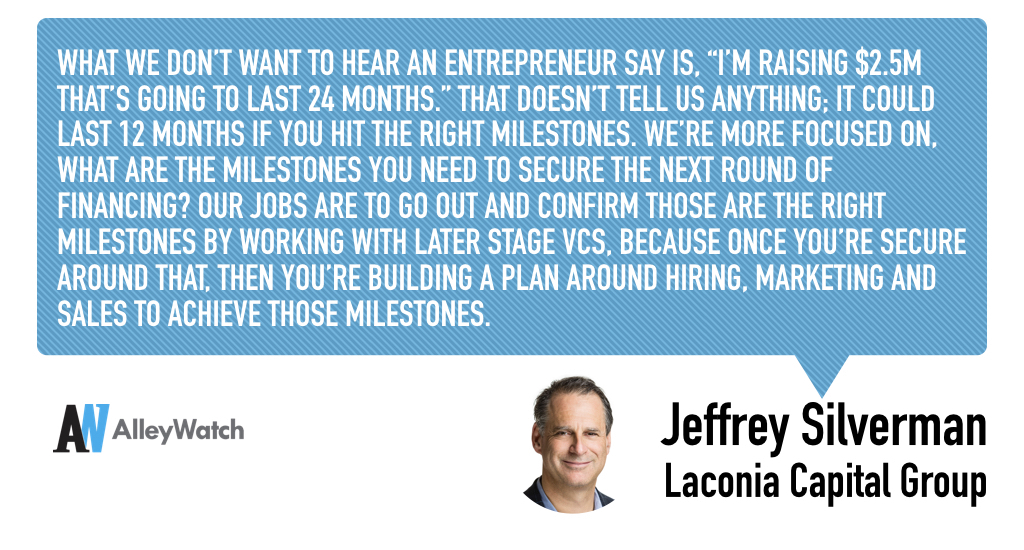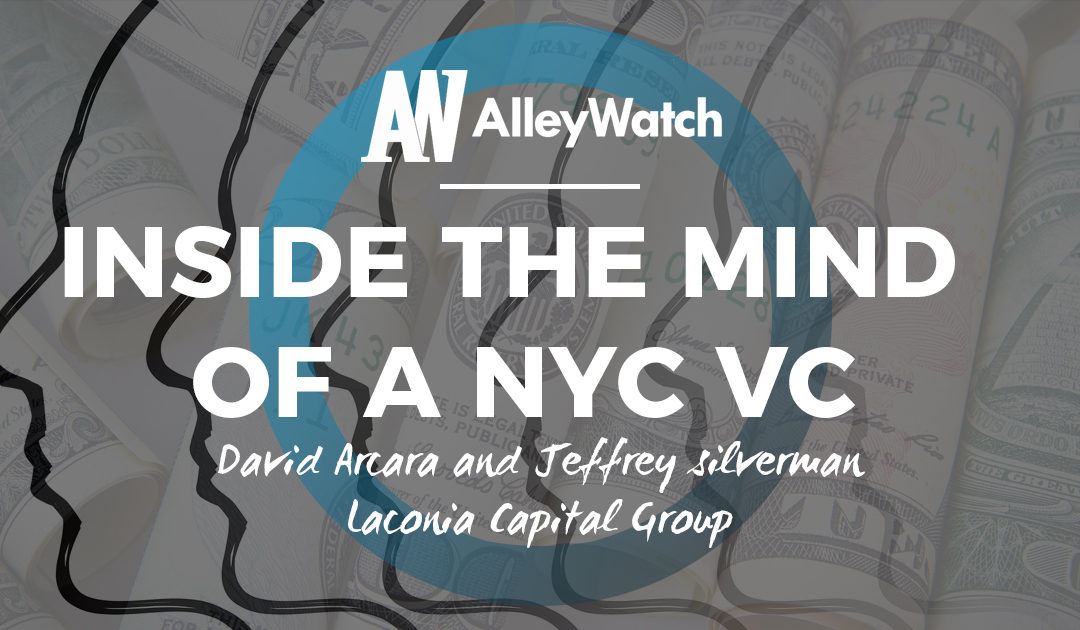
New York City-based Venture Capitalists. In the hot seat this time are not one but two prominent VCs in New York, David Arcara and Jeffrey Silverman, Partners at Laconia Capital Group, a late seed stage B2B venture focused on investments in the Northeast. Jeffrey and David were kind enough to provide an entertaining view of their partnership dynamic, building a firm that captures the best elements of both angel and venture investing, how the Laconia thesis leverages its LP base for entrepreneurs, and much more.
If you are a NYC-based VC interested in participating in this series, please send us an email. We’d love to chat. If you are interested in sponsoring this series that showcases the leading minds in venture in NYC, we’d also love to chat. Send us a note.

Tell us about your backgrounds and how you came to found Laconia Capital Group?
David Arcara, Laconia: My background is primarily as an entrepreneur. After HBS [Harvard Business School], I went to work for the Lifetime cable network and started to see that there was an opportunity during the recession of 1991 to buy radio stations at low cost relative to historical comparables. I raised some money, debt and equity, and bought my first station in the Albany, NY area, and over the following six years, I built a small station group, which I sold to Clear Channel in 1998.
Afterward, I came back down to New York City, where I’m from, and some friends and I started a new company called UGO Networks, which was one of the early ad networks. UGO was targeted to 18-34 year old males; essentially it aggregated web publishers and resold their ad inventory. That company did survive the [dotcom] downturn, and was eventually purchased by Hearst.
In the interim, in 2001, I started a company called Alliance Custom Communications doing custom newsletters, magazines, DVDs, etc., for national marketers. Eventually that business was absorbed into Random House, where we started the Random House Custom Media Division. I was there for a year and a half.
I left there to help run a web publishing company called Imaginova. Their core business was selling telescopes online under the Orion brand. But they also were a web publisher – Space.com was their flagship property, which was the busiess that I lead. I left Imaginova to try to do another startup, that was ‘08/’09, and obviously it was a difficult time to raise money. So I said, “you know what? Maybe it’s time to move to the capital side of the startup ecosystem.”
So I joined New York Angels, and that’s where I met Jeff.
Jeffrey Silverman, Laconia: For the last 30 years I’ve been in media and technology, and actually have a very similar background to David.
I worked at companies like CBS and then headed up sales & marketing for an in-school advertising company, which got sold. During that time as I was deciding what to do next – this was in ‘96 – many people I respected in the industry said to me, “you should look at the internet, it’s going to be like getting into television when it was black & white.”
So I got a job at DoubleClick, where I was one of the early employees. I spent five years there and had multiple senior-level positions. I ended my career there running the media division. We sold it, and then I took over an early stage software company. I evolved from a media person to a broader tech management person, DoubleClick exposed me to technology and to developers and product managers – it was a great experience.
My next company, Integrated Color Solutions, developed software for the publishing industry. I ran that company for about six years, after which I stepped down and joined the New York Angels because I had made a number of angel investments over the years and I wanted to surround myself with other angels to see more of what I didn’t know – which was a lot.
At one of the first New York Angel meetings, I sat next to David. One of the great things about the New York Angels is the people, and the membership. Through my time in that organization I met some fascinating and amazing people – David being one of them.
The vehicle I had created to do some investments was Laconia Ventures. Soon after I had started to do some angel investing, I found that a number of friends and former colleagues would say, “If you see anything really interesting, let me know.”
At the time, I did not want to start a venture fund, so once a month, I’d have dinner at my office with a group of 8-10 people. We’d talk about the two or three deals I’d seen because they’d come directly to me or through New York Angels or through different channels that we had.
David at one point said he’d love to join those dinners. Long story short, we did that for about two years and invested in 25 companies, and our friends and former colleagues came to me and said, “OK, are you going to go back and start a business, or are you going to do this?”
I said, “I don’t want to do it alone. I really enjoy collaboration and having a community.” And that’s when David raised his hand. About three years ago now, we met at a diner on the Upper East Side in August, and he said, “Let’s you and me build something together.”
We didn’t want to just do a traditional venture firm – there’s a lot of them out there, and they’re great, but we tried to put our entrepreneurship hats on, and say, “What’s our personality, what works for us, what’s the best of angel investing, what’s the best of a venture firm, and how can we combine all those pieces to give it our personality and our fingerprint?”
DA: What we liked about the angel world was the collegiality and the transparency of the entire deal process. And we also liked the discipline and the rigor of a thesis-driven venture firm.
The questions we asked ourselves were whether we could combine the two and create a strong sense of community and alignment between investors and the GP, while maintaining maximum transparency and being high-touch even towards our entrepreneurs.
Having been on the other side of the table raising money from VCs, I know sometimes there is a tension between the two sides. Jeff and I wanted to eliminate that tension and break that barrier down. We see getting involved both with investors and with the entrepreneurs as a group activity in order to build great companies. We’re all on the same side, and that’s where this high-touch model that we have comes from. The model we have fosters great relationships and we’re building some great companies.
JS: We called it Laconia Capital Group. We are a late-seed B2B fund that’s focused in the Northeast. Our thesis was that companies could not raise enough money at the seed stage to hit the necessary milestones to secure an A, where the bar keeps rising.
For us, the seed stage investing that we’d done as angels was a little too high risk. We were very sales & marketing and operational-focused. The necessary data and KPIs we would need to see from a company in order to make an informed decision – we wouldn’t find at the early seed stage. We like to see companies that are doing $25-75k in MRR. We want companies that are in Northeast, because we want to develop relationships with them. We want to be able to jump in a car or train and be up to Boston in a few hours or just on the subway and be able to meet with our companies for drinks after work if they’ve had a bad day.
We wanted to use crowdsourcing with our LPs. Our belief was that LPs should, besides their money, have other resources to bring to the table. We wanted to build that community. We speak to our LPs, which consist of family offices and high net worth individuals, a couple of times a month. If we see a deal we like, we let them know about the company and ask if they have any experience or context in that industry. We encourage them to feed us their contacts whom we can turn to during our due diligence.
DA: We bring our LPs into the due diligence process fairly early on. They’re not conducting the actual due diligence; we are still fiduciaries of the fund. But they do see, I think, an extraordinary amount of the sausage-making, if you will, leading up to the eventual closing of a deal. We believe that that transparency is very helpful. It gives the LPs confidence in our process. It also makes us even more accountable to the process. When we do close on a deal, everyone understands the reasons why and the deal has been fully vetted across the LPs, and of course amongst ourselves through our own infrastructure.
JS: We’ll draft an 18-25 page investment memo that we distribute to our LPs prior to us issuing a term sheet or participating in a term sheet. These are bright people, and to not get their insights would be our loss.
They don’t get a vote, however, – David and I are the only investment decision-makers – but they’ve come back with some great questions or insights in situations that maybe we’ve gotten too close to. A fresh set of eyes can offer a really good opinion. We’ve only seen upside from it; it has not slowed down the process. We can complete due diligence in 4-6 weeks.
For the entrepreneur, we build that same type of community. Twice a year, we have our entrepreneurs come together and we host a portfolio roundtable where we bring in a speaker on a certain topic, whether it’s HR, public relations, or whatever else. It allows our entrepreneurs to sit around a table with one another and get to know each other better and ask questions on a topic that might be troubling them. That night, we have a dinner with our LPs and portfolio companies, and they have to meet each other. Our most recent portfolio companies will do a pitch, or the ones who have just completed a raise will give an update on where they are.
To be in a room with 40-50 people and allow them to engage and talk and share ideas really has fostered this strong partnership community that the LPs love to be a part of, and the portfolio companies really enjoy being part of.
When you’re looking for cofounders as an entrepreneur, the guidance is to look for someone whose skills are complementary to yours – someone who brings something meaningfully different from what you do. Does the process of finding a partner for a venture firm operate similarly or is it quite different?
JS: I gotta tell you something: Laconia would not be Laconia without David.
DA: Well, and Laconia would not be Laconia without Jeff. Our wives are very jealous.
JS: We both love rolling up our sleeves and working with the entrepreneurs. David has a knack for the details, the back office, the how do you deal with the lawyers and the fund documents and drafting our PPM and modeling out everything and dealing with the back operations end stuff that would drive me crazy. It allows me to be out meeting people and networking.
It’s a great yin and yang partnership. We’ve been together three years and there hasn’t been one disagreement. If we get a deal that one of us likes and the other’s not sure about, we will literally not talk about it for 72 hours and then we’ll come back and grab breakfast three days later and say to one another, “What do you think now?”
DA: For me, when I’m not initially agreeing with a point of view that Jeff has, my instinct is, I need to understand why he’s believing that because his instincts are really good, and I’m probably missing something. That’s my approach rather than putting forth arguments as to why he’s wrong – I try to search for the argument as to why is he right? And he often is right. When his instincts kick in, there’s a there there.
JS: I have so much respect for solo founders. I think it’s probably the hardest job in the world. To have a partner who has these skills that I somewhat have but don’t necessarily want to develop is so valuable. And better yet, there’s no ego here. If he brings a deal to the table, the response is, “oh my god, great.” It’s not, “oh my god, I have to carry my weight.” There’s a lot of Jewish guilt going back and forth here.
DA: Italian-Jewish guilt.
JS: All kidding aside, it’s really been great. It’s been an absolute perfect match.
On your website you note that you invest in startups “solving immediate efficiency problems in markets and workflows.” Tell us the backstory there – how did that come to be the focus for Laconia?
JS: We are a late seed investor. We know the risk that comes with that. We don’t have the $200M fund to enable us to go to the A-B-C-D [rounds]. We do the late seed and we’ll participate in the A. We know we need to develop a really strong relationship with the entrepreneurs and help them solidify their companies.
Why we like the late seed is it fits our skillset of being operational within marketing and sales. When we go through the due diligence on a company, it’s remarkable to see David look at the financial model and ensure — in most cases it doesn’t — that the financial model matches up to their sales pipeline, their marketing plan, their hiring, and their technology roadmap.
DA: And their capital plan. We see a lot of misalignment between operating plans and capital strategy. We don’t see a lot of entrepreneurs who think about capital in strategic terms – they see it purely as funding, but they’re not tying it into questions like, how does the business execute and what is the efficient role of capital in that process? What are the milestones that need to be reached in that execution? And what are the milestones you need to hit that will trigger subsequent rounds of financing, and how does that impact the way you execute and the way you segment your market?
JS: What we don’t want to hear an entrepreneur say is, “I’m raising $2.5M that’s going to last 24 months.” That doesn’t tell us anything; it could last 12 months if you hit the right milestones. We’re more focused on, what are the milestones you need to secure the next round of financing? Our jobs are to go out and confirm those are the right milestones by working with later stage VCs, because once you’re secure around that, then you’re building a plan around hiring, marketing and sales to achieve those milestones.

DA: And the milestones are not just a specific MRR or something; we’re looking to unpack the process that drives the business. We’re looking for a profitable, repeatable, sustainable model. We’ve passed on companies that had a great MRR that were too rolodex-driven, for instance, and the entrepreneur doesn’t really understand how to build a process around revenue generation. The process is seriously important.
What percentage of founders come to you and you find in fact they have been thoughtful around how the operating plan aligns with the capital strategy? If it’s a small amount, why is that?
JS: I think it’s the ecosystem. I really think the ecosystem…

